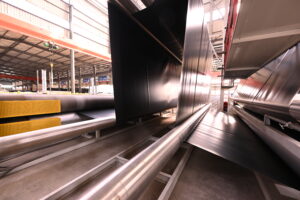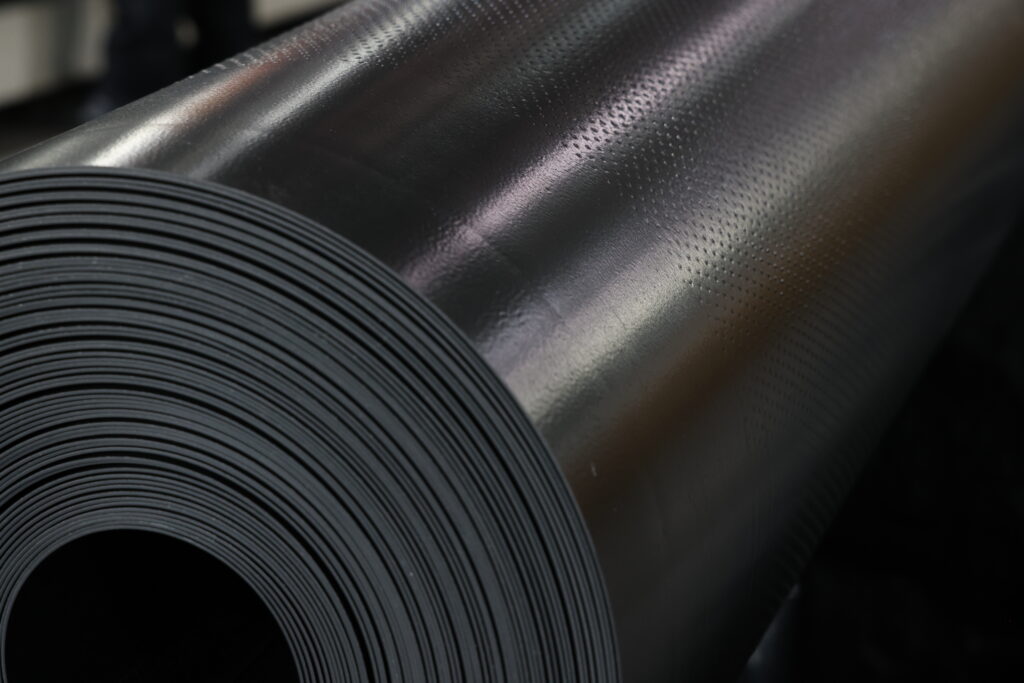What is a geomembrane?
Geomembrane is a film-like material used in civil engineering and soil protection, usually made of polymers such as polyethylene (PE) or polypropylene (PP). Its main function is to prevent moisture, chemicals or other harmful substances from penetrating into the soil, and can be used to prevent the loss of soil particles. Geomembranes generally exhibit properties such as flexibility, corrosion resistance, and aging resistance.
Here are some of the main features and applications of geomembranes:
Barrier function: One of the main functions of geomembrane is to form an effective barrier layer between soil and other engineering materials to prevent the penetration of moisture, chemicals or other harmful substances.
Anti-seepage: Geomembranes are widely used in waterproofing projects, such as reservoirs, river embankments, ponds and tunnels. It can effectively prevent moisture penetration and protect the soil structure.
Soil stability: In civil engineering, geomembranes can be used to improve soil stability, especially in situations where soil reinforcement is required.
Environmental protection: While preventing chemical substances from penetrating into the soil, geomembranes also contribute to environmental protection and prevent toxic substances from contaminating groundwater or soil.
Landfills: Geomembranes are widely used in landfills to prevent leakage from causing pollution to groundwater.
Road Projects: Geomembranes can also be used in some road projects that require soil separation and waterproofing.
Horticulture: In the field of horticulture, geomembranes can also be used to prevent weed growth, keep the soil moist, etc.
It should be noted that the selection and installation of geomembranes in practical applications need to be based on specific engineering requirements, soil characteristics and environmental conditions.

What is HDPE geomembrane?
HDPE geomembrane is a geomembrane made of high-density polyethylene (HDPE, High-Density Polyethylene). HDPE is a thermoplastic with high density, high tensile strength, chemical stability and good corrosion resistance.
The following are some of the main features and applications of HDPE geomembrane:
Anti-seepage effect: HDPE geomembrane is mainly used in anti-seepage projects, which can effectively prevent water, chemicals or other harmful substances from penetrating into the soil. This makes it widely used in water conservancy projects, pools, landfills and other occasions.
High tensile strength: HDPE has high tensile strength, allowing the geomembrane to withstand a certain amount of stretch and strain during installation and adapt to different terrain and soil conditions.
Corrosion resistance: HDPE has strong resistance to chemical corrosion and can resist erosion caused by chemical substances in the soil within a certain range, ensuring its long-term stability.
Environmental adaptability: HDPE geomembrane can maintain its performance under different climate and environmental conditions and has good environmental adaptability.
Long life: Due to the excellent aging resistance of HDPE, HDPE geomembrane has a long service life and is especially suitable for engineering projects that require long-term stability.
Landfill: HDPE geomembrane is often used as an anti-seepage layer in landfills to prevent leakage of garbage from polluting the soil and groundwater.
Reservoirs and ponds: In water conservancy projects, HDPE geomembranes can be used as anti-seepage layers in reservoirs, ponds and channels to ensure the storage and management of water resources.
HDPE geomembrane has a wide range of applications. It plays a key role in preventing seepage and protecting soil and the environment in various engineering projects. When selecting and using HDPE geomembrane, reasonable design and construction must be carried out according to specific project requirements and land conditions.

What is PVC geomembrane?
PVC geomembrane is a geomembrane made of polyvinyl chloride (PVC, Polyvinyl Chloride). PVC is a thermoplastic with good flexibility, chemical stability and waterproofness, so it is suitable for waterproofing, anti-seepage and other applications in geotechnical engineering.
Here are some of the main features and applications of PVC geomembrane:
Waterproofing and anti-seepage: PVC geomembrane is mainly used in civil engineering, water conservancy projects and environmental engineering as a waterproof and anti-seepage barrier layer. It can effectively prevent moisture, chemicals or other harmful substances from penetrating into the soil and protect engineering structures and underground water sources.
Flexibility: PVC geomembrane has good flexibility, making it adaptable to various terrain and landform conditions, and able to cope with certain surface movements.
Corrosion resistance: PVC has good corrosion resistance to some common chemicals, so it can function stably in some environments that may have chemical pollution.
Weather resistance: PVC geomembrane has good weather resistance within a certain range and can maintain performance under different climate conditions.
Easy construction: Because PVC geomembrane is relatively light and easy to handle, its installation and construction are relatively convenient.
Landfill: In landfills, PVC geomembranes are often used as anti-seepage layers to prevent leakage of garbage from contaminating soil and groundwater.
Water conservancy projects: In water conservancy projects, PVC geomembranes can be used as anti-seepage layers in channels, reservoirs, ponds and other places to ensure the effective use of water resources.
It should be noted that when selecting a geomembrane, specific engineering requirements, environmental conditions, soil properties and other factors should be considered to ensure the performance and stability of the geomembrane.


